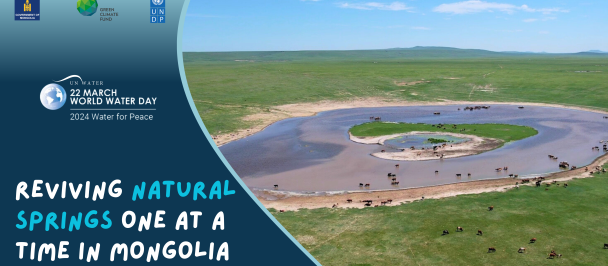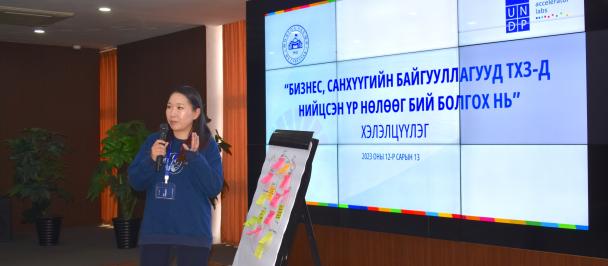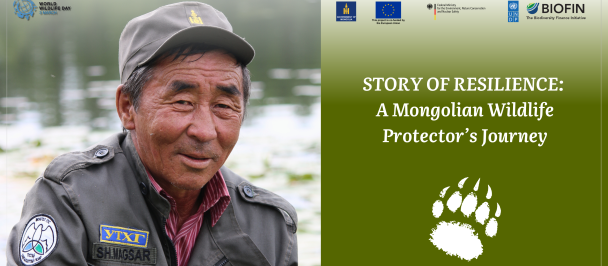Building Momentum Together
November 12, 2023
Arriving in Mongolia last January, the shift from a busy metropolitan city to the vast, snow-covered landscape left me in awe. As I stood there, I could not help but wonder, "Am I on a different planet?"

A snow-covered landscape with Gers, traditional nomadic homes in Mongolia, creates a truly magical scene.
Mongolia, with its population of 3.3 million, stands as the least densely populated country in the world, presenting itself to me as a mysterious nation that defied categorisation.
The challenge that lay before me as a Communications Analyst was how to advocate for gender equality in decision-making within this unique context. For people to listen, I knew I had to speak their language—both literally and metaphorically.
In my observation, I felt the pulse of a society ripe for change, teetering on the verge of embracing gender equality fully. Here is what I observed:
Firstly, the Mongolian people’s adaptability to change was awe-inspiring. The capital city, Ulaanbaatar, claimed the title of the world's coldest capital, yet the majority lived in Gers, traditional nomadic tents, displaying incredible adaptability and tolerance in the face of extreme weather and adversities. A colleague once said, "Have you ever wondered why May is called May? Because it may snow, it may rain," perfectly capturing their open-minded and flexible attitude towards coping with changes.
Secondly, Mongolian society showcased a fascinating mix of gender equality and inequality. Did you know that Mongolia was the first Asian country to grant equal rights to men and women, including the right to vote and be elected in 1924? Despite this progressive step influenced by echoes of communism, where women were encouraged to join the workforce, traditional gender roles persisted, shaping perceptions of women's leadership abilities. This interplay between historical milestones and lingering gender stereotypes painted a unique portrait of Mongolian society.
In our mission to advocate for gender equality in decision-making, we saw an opportunity. A gentle nudge could unleash a transformative shift, leading towards a more equal society. We understood that challenging these gender norms was vital in sparking fundamental change. With support from the Korea International Cooperation Agency (KOICA), our UNDP project seized the chance to implement groundbreaking communication initiatives nationwide, targeting both the general public and decision-makers.
Here are three deeply ingrained gender social norms we debunked through our campaign:
“Gender equality is a foreign concept that is not relevant to Mongolia.”
The adoption of the foreign term "gender (Жендэр)" in the Mongolian language may have made it seem unfamiliar, but gender equality was not a new concept. Our approach was to bridge the gap effectively. By incorporating the familiar imagery of the two columns of Gers into our campaign message, we visualised the essence of gender equality, showing its strong connection and relevance to the Mongolian heritage.

Brainstorming ways to visualise gender equality in decision-making using two columns of Gers. These columns symbolise men and women, effectively illustrating the current parliamentary disparity: 17% women and 83% men, while advocating equal representation similar to the balanced columns in Gers.
“There are not enough women who are capable enough to be in politics or decision-making.”
Did you know that 60.7% of enrolled students in higher education are women, outnumbering men at 39.3%? Mongolia does not lack capable women; they lack an enabling environment that can propel them into decision-making. To normalise the idea of women in leadership, we created a diverse range of content—over a thousand pieces, including videos, short stories, and quote posts—in collaboration with our project partners. These compelling materials, disseminated through both online and offline channels, showcased the inspiring stories of women leaders and also highlighted the abundance of capable women eager to participate in decision-making roles.
Additionally, we empowered 800 journalists with cutting-edge training in gender-sensitive reporting through a collaboration with the Media Council of Mongolia. These journalists, armed with tools like photos and infographics and a database featuring women leaders, and backed by monthly editorial support, became the backbone of change. Their stories echoed empowering narratives, creating a vibrant space where women's leadership thrived.

The photo exhibition showcased compelling images captured by photographers trained in gender sensitive reporting through our project, amplifying the impact of our campaign event.
“People, including family, friends, and neighbours, would not accept women leaders.”
We challenged this normative belief by creating a safe space for discussions at Tentsuu.mn, encouraging open conversations without the weight of others' opinions and the menace of online harassment. This online platform has blossomed into a vibrant community, nurturing lively discussions on gender issues, fostering community building, and facilitating the exchange of information and insights.
Furthermore, to promote active engagement and meaningful participation —not just passive acknowledgement of information— we crafted compelling campaign slogans for each phase. Starting with "Let’s participate and let’s represent," we captured public attention and curiosity by using easy, familiar, and relevant messages. As the campaign progressed, the slogan evolved into "(I/we) will participate and will represent," underscoring the responsibility and ownership each person had in taking part in this movement. This emphasis was further reinforced through our pledge campaign.

As part of the pledge campaign, ten political parties committed to advancing gender equality in decision-making, and the momentum extended to encourage the wider public to join in and make their own pledges for gender equality in decision-making.
Our initiatives, in harmony with the Mongolian people’s openness to change and the intrinsic equality within its society, had propelled a significant momentum. This was evident in recent legal reforms that raised the gender quota from 20% to 30% for the upcoming parliamentary election in 2024 and further increased it to 40% for 2028.
But we are not stopping here.
We will continue our efforts to break gender barriers and ensure the right to elect and be elected for everyone in Mongolia.
Together, we can create a more inclusive society where every voice is heard and every person is empowered.

 Locations
Locations



